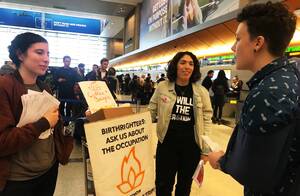“Reimagine and Reclaim the Concept of Birthright”
Young Jews, regardless of means, should have the opportunity to invest in strengthening our Jewish lives however we see fit.
This article is part of a roundtable on the ethical response to Birthright. Click here to read the rest of the conversation.

PROTESTING THE BIRTHRIGHT ORGANIZATION in order to change Israeli policy toward the Palestinians is important, but young Jews also need to reimagine and reclaim the concept of Birthright and what it means for our Jewish identity. Rather than merely calling on young Jews to walk off Birthright trips or reject them altogether, we should demand the option to take the money that would have gone to our Birthright trips and reinvest it in strengthening our Jewish lives however we see fit. Through such a program, students could choose to spend ten days at the Yiddish Farm, take a week to study Torah at a yeshiva like Svara or Hadar, participate in a program about Ashkenazi cuisine on the Lower East Side, or learn about Jewish life in Morocco or Poland, all as a springboard for building robust adult Jewish lives.
Critics of Birthright must acknowledge that Birthright is unique in the Jewish world because it is a class-blind program that is open to anyone, regardless of income or Jewish education. On paper, it is intended to allow participants the opportunity to meet Jewish peers, learn about Jewish culture and history, and explore the role they want Judaism to play in their lives. Although it frequently fails to live up to this standard, when I was co-president of my college Hillel, I heard stories, particularly from low-income Jews, about what it meant to them to be able to explore their Jewish identity for free without any fear that they might be rejected for not being “Jewish enough.” When we assume that people only support Birthright because they support the occupation, we ignore a crucial demographic that disagrees with the organization’s politics but appreciates and relies on these trips and the free and accessible Jewish opportunities they provide.
Of course, these trips are highly problematic, primarily because of the role they play in normalizing and maintaining the Israeli occupation. But they also offer a narrow vision of Jewish identity, placing Israel at its core. As the sociologist Shaul Kelner notes, Birthright builds a vision for diaspora Jewry wherein Israel is seen as the spiritual center, sustaining the periphery. These trips frequently traffic in a modern version of shelilat hagolah (negation of the exile), the idea that Jewish life in the diaspora is inferior. When Prime Minister Benjamin Netanyahu told Birthright participants in 2015 that Israel is the only safe place to be Jewish, he was telling them their lives are defective outside of Israel.
A trip intended to convince young American Jews they should identify with a foreign country, or perhaps even move abroad, does not encourage vibrant American Jewish life. As Leonard Saxe, a professor of Jewish studies at Brandeis who is among the main researchers of Birthright, says, “Birthright’s most persistent and long-lasting impact is on participants’ connection to Israel.” If Birthright has any impact on American Jewish life, Saxe adds, it is manifest in its impact on intermarriage. But this impact is both uninspiring and leads to an unsafe sexual climate for participants (especially women).
Instead of supporting Birthright, we should invest in accessible, welcoming programming that supports our home communities, rather than denigrating them. The radical British Jewish group Jewdas has already begun offering a diasporic alternative, running “Birthwrong” trips to learn about Jewish history in Spain and France. To fund such a program with Birthright’s budget would be revolutionary. Instead of following an itinerary established by ideologically motivated donors, young Jews should assert themselves as the ones best equipped to strengthen their own diverse Jewish identities. Such a movement would speak directly to the many Jewish leaders who support Birthright because of what it attempts to do for Jewish life, and show them that young Jews are protesting Birthright precisely because they want to be able to choose their own Jewish experiences and improve their local Jewish communities.
A new approach to protesting Birthright is needed, which recognizes that an investment in the Jewish future in the places where we live is critical to building vibrant Jewish life worldwide. Working to present a positive alternative vision for diaspora Jews would complement, not replace, the ongoing work by leftist groups, both Jewish and Palestinian, to protest Birthright. By starting a movement to reclaim the Birthright, we can support the creation of vibrant American Jewish life in addition to ending American Jewish support for the occupation.
Michael Zanger-Tishler is a PhD student in sociology and social policy at Harvard University, where he studies the intersection of race and punishment, policing, and the criminal justice system from a comparative perspective. As an undergraduate, he was the co-president of the Yale Hillel and an editor of Shibboleth, Yale’s Undergraduate Journal of Jewish Thought.

